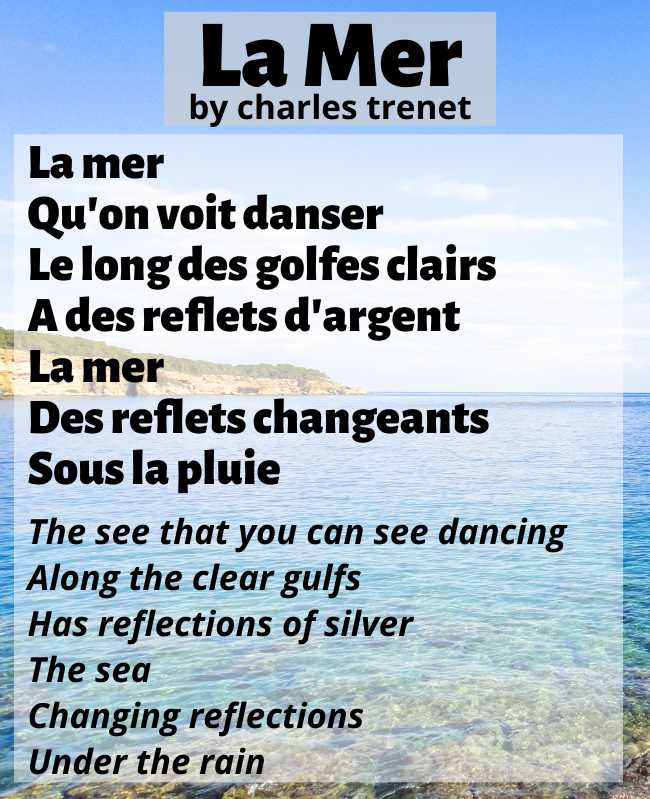The song “La Mer” (meaning: the sea) is the most successful song of French singer Charles Trenet (1913 – 2001). Recorded in 1946 just after World War II, it is the most famous French songs of all time after Edith Piaf’s “La Vie en Rose”. The song appeared on Trenet’s album, “La Mer / Seul … depuis toujours”.

La Mer – Song Overview & History
Trenet originally wrote the song’s lyrics in his teens. However, he wrote the tune to the song later in life in 1943 while traveling by train in southern France and looking out of the window at Étang de Thau. The song was done in the style of chanson, which is a lyric-oriented French song.
La Mer became an international hit during the 20th century with thousands of recordings and millions of albums sold.
Other notable recordings of the song were released by Bing Crosby and Julio Iglesias among others. The song has also been featured in many films including L.A. Story (1991), French Kiss (1995), and Mr Bean’s Holiday (2007).
Listen to La Mer
Watch the following YouTube video of La Mer and follow along with the lyrics below.
Listen with YouTube
Listen with Spotify
La Mer French Lyrics & English Translation
La mer
Qu’on voit danser
Le long des golfes clairs
A des reflets d’argent
La mer
Des reflets changeants
Sous la pluie
The sea that you can see dancing
Along the clear gulfs
Has reflections of silver
The sea
Changing reflections
Under the rain
La mer
Qu’au ciel d’été confond
Ses blancs moutons
Avec les anges si purs
La mer
Bergère d’azur, infinie
The sea
Under the summer sky blends
Its white sheep
With the angels so pure
The sea
Infinitive shepherdess of blue
Voyez
Près des étangs
Ces grands roseaux mouillés
Voyez
Ces oiseaux blancs
Et ces maisons rouillées
See
Near the ponds
These tall wet reeds
See
These white birds
And these dampened houses
La mer
Les a bercés
Le long des golfes clairs
Et d’une chanson d’amour
La mer
A bercé mon cœur pour la vie
The sea
Cradled them
Along clear gulfs
And of a love song
The sea
Cradled my heart for life
La mer
Qu’on voit danser
Le long des golfes clairs
A des reflets d’argent
La mer
Des reflets changeants
Sous la pluie
The sea that you can see dancing
Along the clear gulfs
Has reflections of silver
The sea
Changing reflections
Under the rain
La mer
Au ciel d’été confond
Ses blancs moutons
Avec les anges si purs
La mer
Bergère d’azur, infinie
The sea
Under the summer sky blends
Its white sheep
With the angels so pure
The sea
Infinitive shepherdess of blue
Voyez (voyez)
Près des étangs (près des étangs)
Ces grands roseaux mouillés (voyez ces roseaux)
Voyez (voyez)
Ces oiseaux blancs (ces oiseaux blancs)
Et ces maisons rouillées (la-la-la-la-la-la)
See
Near the ponds
These wet reeds
See
These white birds
And these dampened houses
La mer
Les a bercés (les a bercés)
Le long des golfes clairs
Et d’une chanson d’amour
La mer
A bercé mon cœur pour la vie
The sea
Cradled them
Along clear gulfs
And of a love song
The sea
Cradled my heart for life
La Mer lyrics analysis
The song’s lyrics offer a poetic images of the sea with the lines depicting images of shimmering and dancing reflections with waves like white sheep and angles.
These two first lines of the song translate to “the sea, that you can see dancing”. The personal pronoun on in this line could translate to “you”, “we” or “one”.
Le long des golfes clairs
This line translates to “along the clear gulfs”. The preposition le long de means “along” as in “walking along” or “on the edge of”. Clair means “light”. For example, bleu clair is light blue. I touch on this on my colors vocabulary lesson.
A des reflets d’argent / des reflets changeants
These words translate to “has reflections of silver” and “has changing reflections”. These are images of “dancing” sea. The masculine noun argent means both silver and money.
Changeant (changing) is the present participle of the verb changer (to change).
Sous la pluie
This line translates to “under the rain”. The feminine adjective pluie means “rain”. The verb pleuvoir means “to rain” and il pleut means it’s raining.
Qu’au ciel d’été confond
This line translates to “under the summer sky blends”. Été is both a masculine noun meaning “summer” and a form of être (to be) meaning “was” or “have/has/had been”.
Ses blancs moutons, Avec les anges si purs
This line translates to “its white sheep, with the angels so pure”. These are meant to be metaphorical images for the sea’s white waves.
Bergère d’azur, infinie
This line translates to “shepherdess of infinite blue”. Here, Trenet is suggesting that the sea is a shepherd to the white sheep described in the previous line.
Voyez, près des étangs
This line translates literally to “see, near the ponds”. In the context of the sea, Trenet is probably referring to tide pools.
Ces grands roseaux mouillés
This line translates to “these tall wet reeds”. Ternet is making reference to the roseau, a sea reed which grows along France’s seashore.
Ces oiseaux blancs
This line translates to “these white birds”. This lesson explains the adjective blanc (white).
This line translates literally to “and its rusted (or rusty) houses”. According to the Word Reference definition for rouiller, another translation of rouiller “to dampen”. Thus, I used this translation in the context of houses dampened by the rain and sea waves.
Et d’une chanson d’amour
This line translates to “and of a love song”. The feminine noun chanson means “song” while chanter means “to sing”.
La mer les a bercés…a bercé mon coeur pour la vie
The French verb bercer translates to rock, cradle, lull and soothe. In this line, I believe Trenet is suggesting that the sea cradled or soothed the houses and birds mentioned in the previous lines.
I interpret “a bercé mon coeur pour la vie” as having a soothing or calming effect on him during his lifetime.

All French songs | Lessons by David Issokson
French song lyrics:
- La Vie en Rose (Edith Piaf)
- Non, Je Ne Regrette Rien (Edith Piaf)
- Milord (Edith Piaf)
- Sous Le Ciel De Paris (Edith Piaf)
- Mon Dieu (Edith Piaf)
- Dominique (Singing Nun)
- Ne Me Quitte Pas (Jacques Brel)
- Port of Amsterdam (Jacques Brel)
- La Bohème (Charles Aznavour)
- C’est Si Bon (Yves Montant)
- Les Champs Élysées (Joe Dassin)

